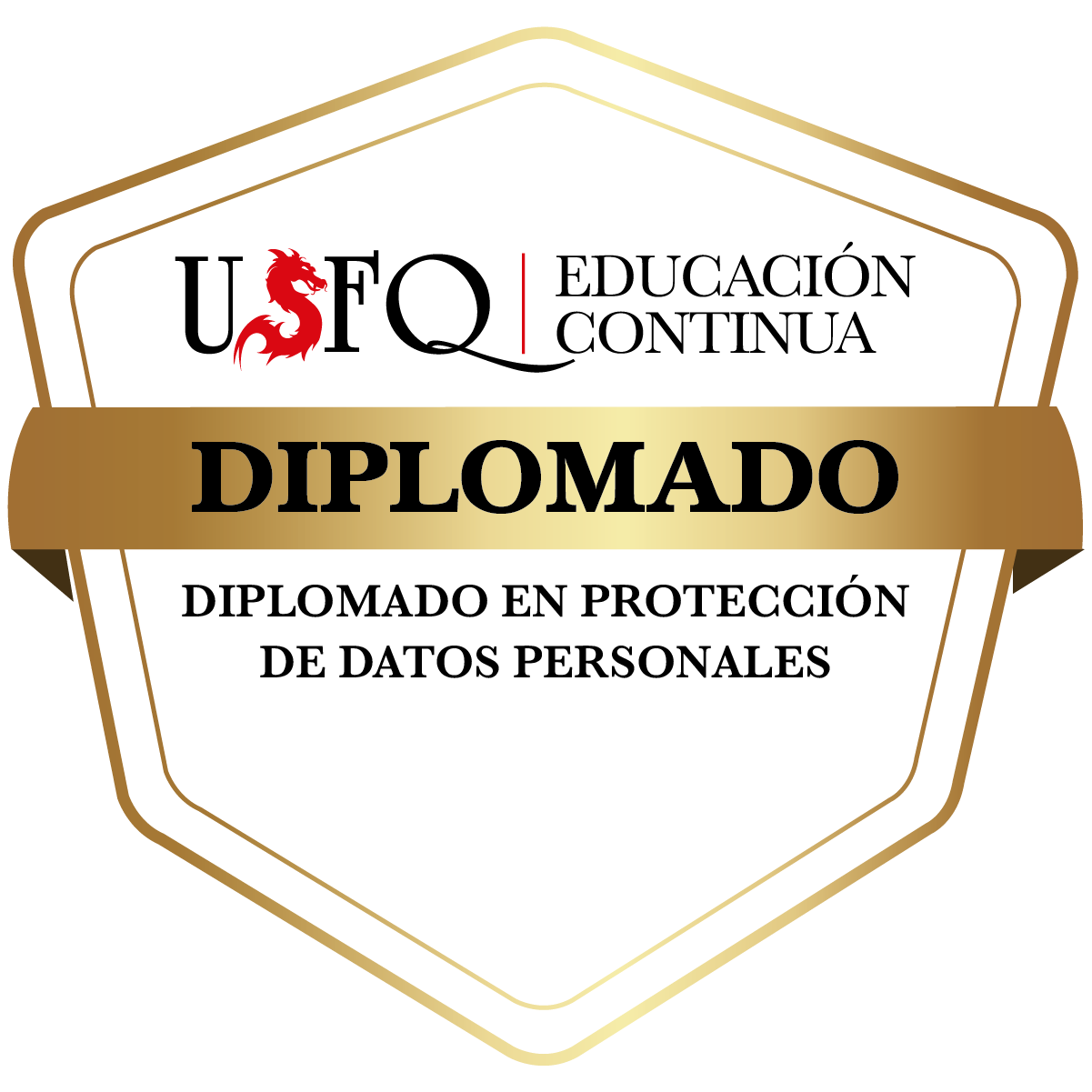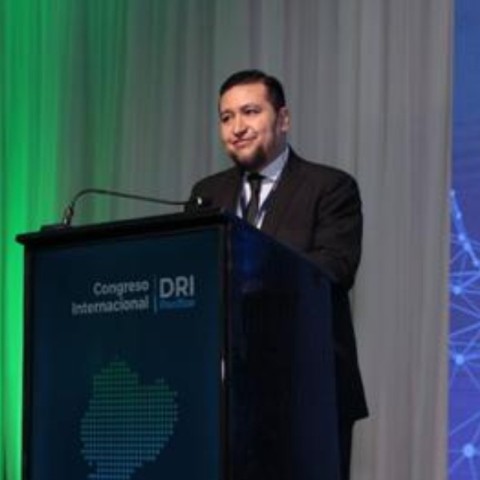Diploma in Personal Data Protection 2024
Fechas
Registro
This diploma aims to equip professionals with the necessary tools to face the changing challenges in today's digital landscape. The importance of personal data protection is undeniable in an increasingly interconnected world. We will delve into how regulations and security practices intertwine to ensure privacy online. As technology advances, the need to safeguard personal data becomes fundamental, and this bootcamp will provide you with the skills to tackle this evolving challenge.
Duration: 70 academic hours
- 54 academic hours in real-time via Zoom with the instructor
- 16 hours of self-study
Alignment with SDGs:
The program is designed and aligned directly with the following SDG:
- Goal 16: Peace, Justice and Strong Institutions
This SDG addresses governance issues, access to information, and strengthening institutions to promote peaceful and just societies. Personal data protection and online security are important components of digital governance and the establishment of strong institutions that can regulate and supervise the use of technology ethically and safely. By equipping professionals with the necessary skills to address these changing challenges in the digital landscape, the diploma contributes to the promotion of a society where individual rights are respected and safe online practices are established.
Online
70 academic hours
Wednesday, Friday, and Saturday.
*(Verify schedule - variant schedule)
Tarifa Público General: $960
Tarifa Pronto Pago: $890
Tarifa Comunidad USFQ: $910
Tarifa Grupal: $900
General Description
General Objective
The primary objective of this program is to train participants in the understanding and effective application of personal data protection practices. Upon completion of the program, attendees will have acquired a solid knowledge of current regulations, as well as best practices in data protection and risk management. Our goal is to empower professionals to address current and future challenges in data protection, thus contributing to the creation of a secure digital environment that respects privacy.
Specific Objectives
- To provide participants with a solid understanding of current regulations and norms in the field of personal data protection, enabling them to effectively apply relevant legal frameworks in professional environments.
- To familiarize attendees with essential technical and technological practices to ensure the security of personal data.
- To empower professionals to design comprehensive risk management strategies in the context of personal data protection.
Specific Course Learning Outcomes
|
# |
Learning Outcomes |
Level |
|
1 |
Design privacy policies: develop transparent and effective policies for handling personal data. |
High |
|
2 |
Analyze the implementation of security measures: implement security strategies to safeguard personal data. |
High |
|
3 |
Understand global regulations: analyze and apply data protection regulations at local and international levels. |
Medium |
|
4 |
Understand how to respond to incidents: manage and respond to security incidents affecting data privacy. |
Medium |
Target Audience
The program is aimed at professionals and executives associated with the legal industry, public officials, and law students.
Clarification Note: It is desirable but not mandatory for candidates to have a background in Law.
Graduate Profile
Professionals from this program will be equipped to understand and apply data protection regulations globally, implement effective cybersecurity measures, design transparent privacy policies, and respond to security incidents, thus demonstrating a solid knowledge in comprehensive data privacy management.
Content
Module 1: Introduction and Legal Framework of Data Protection
Duration: 9 hours
Module Content:
- Introduction and history of Personal Data Protection (PDP)
- Principle of informational self-determination and right to personal data protection
- General legal framework: local
- Rights, principles, and obligations in PDP
- Application for legal entities vs. natural persons
- Global perspective: comparative legislation in PDP
Teaching Methodology: Virtual classes
Module 2: Roles in Data Protection and Comparative Legislation
Duration: 7.5 hours
Module Content:
- National System of Personal Data Protection
- Roles: data subject, controller, processor, assignee, recipient
- Right to data protection: transparency, legality, purpose, relevance, and minimization
- Right to data protection: retention, quality and accuracy, favorable application to the data subject, independent oversight
- Right to data protection: security and proactive responsibility
Teaching Methodology: Virtual classes
Module 3: Personal Data Protection and Organizational Management
Duration: 6 hours
Module Content:
- Strategic vision of technologies within the organization
- Strategic vision of information security: duties of secrecy and security
- Data protection authorities
- Practical Workshop: Implementation and management (Practical Adjustments)
Teaching Methodology: Virtual classes
Module 4: Methodology and Risk Assessment in PDP
Duration: 6 hours
Module Content:
- Identification of threats, risk assessment, Data Protection Impact Assessment (DPIA)
- Risk management and security systems in PDP
- Incident management: assessment and notification
- Data protection and information systems auditing
Teaching Methodology: Virtual classes
Module 5: Implementation of Policies and Best Practices in PDP
Duration: 6 hours
Module Content:
- Implementation of policies and solutions in PDP
- Implementation of best practices in PDP
- Data Protection Officer
- Practical Workshop: Legal, organizational, and technological compliance (Use of Technological Tools)
Teaching Methodology: Virtual classes
Module 6: Data Protection and Technology
Duration: 7.5 hours
Module Content:
- Technological trends, impact, and application: Big Data, profiling, Smartphones, IoT, AI, Blockchain, and Data Protection
- Success stories and implementation experiences
- Challenges and opportunities in disruptive technologies
- Monetization of personal data
- Workshop on technological regulation in PDP
Teaching Methodology: Virtual classes
Module 7: Personal Data Protection: Legislation, Cases, and Scope
Duration: 6 hours
Module Content:
- Legitimization bases: consent vs. legitimate interest
- Legitimization bases: disposition of authority, legal obligation, pre-contractual measures, and contractual obligations
- Legitimization bases: public interest and exercise of public authority, vital interest
- Analysis of cases and jurisprudence (Comparative Law)
Teaching Methodology: Virtual classes
Module 8: Security, Cybersecurity, and Active Responsibility in PDP
Duration: 6 hours
Module Content:
- Information Security Management System (ISMS)
- Privacy by design and by default
- Security breaches and how to handle them
- Practical Workshop: Implementation of ISMS and breach management
Teaching Methodology: Virtual classes
Schedule
| March | 20 | Wednesday | 1.5 | 08:00 AM - 09:30 AM | Module 1: Introduction and Legal Framework of Data Protection | General legal framework: local | Diego Álvarez-ECU |
| 1.5 | 06:00 PM - 07:30 PM | Introduction and history of Personal Data Protection (PDP) | Christian Espinosa Velarde-ECU | ||||
| 22 | Friday | 1.5 | 08:00 AM - 09:30 AM | Rights, principles, and obligations in PDP | Rubén Lahiguera-ESP | ||
| 1.5 | 09:30 AM - 11:00 AM | Global perspective: comparative legislation in PDP | Christian Espinosa Velarde-ECU | ||||
| 23 | Saturday | 1.5 | 08:00 AM - 09:30 AM | Principle of informational self-determination and right to the protection of personal data | Christian Espinosa Velarde-ECU | ||
| 27 | Wednesday | 1.5 | 06:00 PM - 07:30 PM | Application for legal vs. natural persons | Cristina Rodríguez Corzo - Colombia |
| April | 3 | Wednesday | 1.5 | 06:00 PM - 07:30 PM | Module 2: Roles in Data Protection and Comparative Legislation | National System of Personal Data Protection | Christian Espinosa Velarde-ECU |
| 1.5 | 07:30 PM - 09:00 PM | Right to data protection: conservation, quality and accuracy, favorable application to the owner, independence of control | Christian Espinosa Velarde-ECU | ||||
| 5 | Friday | 1.5 | 08:00 AM - 09:30 AM | Roles: owner/interested party, controller, processor, assignee, recipient | María González Moreno | ||
| 6 | Saturday | 1.5 | 08:00 AM - 09:30 AM | Right to data protection: transparency, legality, purpose, relevance and minimization | Nelia Álvarez García-ESP | ||
| 1.5 | 09:30 AM - 11:00 AM | Right to data protection: security and proactive responsibility | Christian Espinosa Velarde-ECU | ||||
| 10 | Wednesday | 1.5 | 06:00 PM - 07:30 PM | Module 3: Personal Data Protection and Organizational Management | Practical workshop: Implementation and management (Practical adjustments) | Cristina Rodríguez Corzo - Colombia | |
| 1.5 | 08:00 AM - 09:30 AM | Strategic vision of information security: duties of secrecy and security | Javier Arnaiz-ESP | ||||
| 12 | Friday | 1.5 | 08:00 AM - 09:30 AM | Strategic vision of technologies within the organization | Javier Arnaiz-ESP | ||
| 1.5 | 09:30 AM - 11:00 AM | Module 4: Methodology and Risk Assessment in Data Protection | Data protection and information systems audit | Christian Espinosa Velarde-ECU | |||
| 13 | Saturday | 1.5 | 08:00 AM - 09:30 AM | Threat identification, risk assessment, Data Protection Impact Assessment (DPIA) | Cristina Rodríguez Corzo - Colombia | ||
| 1.5 | 09:30 AM - 11:00 AM | Data protection authorities | Cristina Rodríguez Corzo - Colombia | ||||
| 17 | Wednesday | 1.5 | 06:00 PM - 07:30 PM | Data Protection Officer | Beatriz Tato- ESP/ECU | ||
| 19 | Friday | 1.5 | 08:00 AM - 09:30 AM | Module 5: Implementation of Policies and Best Practices in Data Protection | Implementation of best practices in data protection | Diego Álvarez-ECU | |
| 1.5 | 09:30 AM - 11:00 AM | Implementation of policies and solutions in data protection | |||||
| 20 | Saturday | 1.5 | 08:00 AM - 09:30 AM | Module 4: Methodology and Risk Assessment in Data Protection | Risk management and security systems in data protection | Fernando Villagómez Bustillo -ESP | |
| 1.5 | 09:30 AM - 11:00 AM | Incident management: assessment and notification | Fernando Villagómez Bustillo -ESP | ||||
| 24 | Wednesday | 1.5 | 08:00 AM - 10:00 AM | Module 5: Implementation of Policies and Best Practices in Data Protection | Practical workshop: Legal, organizational and technological compliance (Use of Technological Tools in Data Protection) | Diego Álvarez-ECU & José Sebastián Ponce -ECU | |
| 26 | Friday | 1.5 | 08:00 AM - 09:30 AM | Module 6: Data Protection and Technology | Concepts, challenges, and opportunities in technologies | José Sebastián Ponce-ECU | |
| 1.5 | 09:30 AM - 11:00 AM | Success stories and implementation experiences | Christian Espinosa Velarde-ECU | ||||
| 27 | Saturday | 1.5 | 08:00 AM - 09:30 AM | Technological trends, impact, and application: Big Data, profiling, Smartphones, IoT, AI, Blockchain, and Data Protection | Diego Álvarez-ECU | ||
| 1.5 | 09:30 AM - 11:00 AM | Monetization of personal data | Alejandro Varas-ECU | ||||
| May | 1 | Wednesday | 1.5 | 08:00 AM - 09:30 AM | Workshop on technological regulation in data protection | Diego Álvarez-ECU |
| May | 8 | Wednesday | 1.5 | 08:00 AM - 09:30 AM | Module 7: Personal Data Protection: Legislation, Cases, and Scope | Legal bases: authority provision, legal obligation, pre-contractual measures, and contractual obligations | Esperanza López Prado - ESP |
| 10 | Friday | 1.5 | 08:00 AM - 09:30 AM | Legal bases: public interest and exercise of public authority, vital interest | |||
| 11 | Saturday | 1.5 | 08:00 AM - 09:30 AM | Legal bases: consent vs legitimate interest | Diego Álvarez-ECU | ||
| 1.5 | 09:30 AM - 11:00 AM | Case analysis and jurisprudence (Comparative Law) | Cristina Rodríguez Corzo - Colombia | ||||
| 15 | Wednesday | 1.5 | 06:00 PM - 07:30 PM | Module 8: Security, Cybersecurity, and Active Responsibility in Data Protection | Security breaches and how to handle them | Gabriel Llumiquinga- ECU | |
| 17 | Friday | 1.5 | 08:00 AM - 09:30 AM | Practical workshop: Implementation of ISMS and breach management | |||
| 18 | Saturday | 1.5 | 08:00 AM - 09:30 AM | Information Security Management System (ISMS) | Christian Espinosa Velarde-ECU | ||
| 1.5 | 09:30 AM - 11:00 AM | Privacy by design and by default | Elisabet Viñes & José Manuel Miralles-ESP |
Parameters for Certificate Issuance
Evaluation Mechanism
The weighting of each component is distributed as follows:
|
Category |
Description |
Percentage of Final Grade |
|
Module 1 |
Short quiz |
10% |
|
Module 2 |
Short quiz |
10% |
|
Module 3 |
Short quiz |
10% |
| Module 4 | Short quiz | 10% |
| Module 5 | Short quiz | 10% |
| Module 6 | Short quiz | 10% |
| Module 7 | Short quiz | 10% |
| Module 8 | Short quiz | 10% |
| Zoom Sessions (attendance and participation) | The student must attend at least 80% of the sessions | 20% |
Certificate of Approval
Upon completion of the program, the participant must achieve a minimum of 80% total attendance and 80% of components to receive the Certificate of Approval issued by Universidad San Francisco de Quito.
Digital Credential
Participants who pass the program by meeting the minimum requirements will also receive a digital credential on the Credly platform, allowing them to showcase their academic achievements to their community in a more visual and straightforward manner.

Instructors

José Sebastián Ponce
He holds a law degree from the University San Francisco de Quito and an LLM in Law and Business from the University of Pennsylvania. Additionally, he has pursued studies in Innovation and Entrepreneurship as well as Business Design from Wharton Business School, also at the University of Pennsylvania. He also earned an MBA from the University San Francisco de Quito.
Currently, he is the Founder of LegalTech initiatives Arupo and Adjudica and serves as Off Counsel for the Technology and Innovation area at ECIJA GPA. He is a Professor at the College of Jurisprudence at the University San Francisco de Quito and serves as the Director of the Legal Lab USFQ.

Diego Álvarez
Diego Alvarez Mejía is a Lawyer specialized in Data Protection and Digital Regulation, currently serving as the Country Manager for Ecuador at Niubox Legal/Digital. He obtained his law degree from the Pontifical Catholic University of Ecuador (PUCE) and holds a master's degree in Telecommunications Law, Data Protection, Audiovisual, and Information Society from the Universidad Carlos III de Madrid. He is the Founder and current President of the Ecuadorian Association of Data Protection. Additionally, he serves as the Secretary Director of the Ecuadorian Chamber of Innovation and Technology (CITEC). With over 10 years of professional experience in International Law Firms, he is also an international speaker at academic and business forums, delivering lectures on Law, Technology, Innovation, and Data Protection. Furthermore, he is a professor of Legal Innovation and Legaltech at various private universities in Ecuador.

Christian Espinoza
Christian is a partner at ECIJA Ecuador, specializing in intellectual property, industrial law, audiovisual law, privacy, and data protection. With over 7 years of experience in new technology law, e-government, cybersecurity, and personal data protection, he has served as an advisor to the Ecuadorian Government and national and international companies on new technology matters.
He has led government projects in information and personal data protection for government entities and private companies.
Christian holds a Bachelor's degree in Law from the University of the Americas, a Master's degree in Cybersecurity Law and the Digital Environment from the University of León, and a Diploma in Human Rights to Privacy and Personal Data Protection from the Inter-American Institute of Human Rights. He is a member of the AECI and the ED Network.

Beatriz Tato
Beatriz is a Spanish-Ecuadorian lawyer with over 13 years of experience in the legal sector, where she has led projects implementing Criminal Compliance programs and Personal Data Protection Management Systems. Currently, she serves as the Compliance Officer and Data Protection Officer (DPO) at Telefónica Ecuador. In this role, she defines and coordinates Criminal Compliance and Cybercompliance programs. Additionally, she fulfills all the roles required by Ecuadorian regulations for DPOs, as well as those outlined by the company's corporate regulations.
She graduated in Law from the University of Extremadura in Cáceres, Spain, and completed a one-year Erasmus scholarship in Law at the University of Iceland, Reykjavik. She holds a Master's degree in Economic Criminal Compliance from the International University of La Rioja, Spain.
Beatriz has delivered presentations at Compliance forums in Ecuador and Peru, as well as on topics related to Data Protection and Cybersecurity. She has also been part of specialization commissions in Criminal Compliance in Ecuador and Spain.

Cristina Rodríguez
Cristina is a lawyer from the University of Rosario (Bogotá, Colombia), specializing in Commercial Law, and holds a Master's degree in Private Law from the University of Los Andes.
A significant portion of her professional career has been spent at the Superintendence of Industry and Commerce of Colombia (SIC), where she served as Head of International Affairs and later led the Delegation for the Protection of Personal Data as the Colombian Data Protection Authority responsible for overseeing and ensuring compliance with principles, rights, and obligations regarding the processing of personal data in Colombia.
Her experience in international cooperation and interinstitutional relations has enabled her to strengthen SIC's cooperation ties with international counterparts and to participate in and lead discussions on global trends in data protection regulation. Currently, Cristina is a member of the Colombian Association of Data and Privacy (ADAPRI).
She joined OlarteMoure's team in May 2023 as Coordinator of the Privacy and Personal Data area.

Daniela González
María is a partner in the technology, media, and telecommunications areas at ECIJA. With over 17 years of experience as a lawyer specializing in technology law, information security, regulatory compliance, and privacy, she has extensive experience in the implementation, adaptation, and auditing of personal data protection processes, implementation of information security management systems, and electronic signature, among others. María also has experience in legal defense before the Spanish Data Protection Agency, the Telecommunications Market Commission, and the State Secretariat for Telecommunications.
She holds a Law degree from the University of Alcalá de Henares and a Master's degree in New Technologies Law from Aliter. María is a member of the Madrid Bar Association and is fluent in English and Spanish.

Alejandro Varas
Computer Engineer in Management with a specialization in Digital Graphic Design from the Federico Santa María Technical University, Guayaquil Campus. Specialization in Entrepreneurship and Innovation from the University of Maryland, Park City. International certification in Business Innovation from Certiprof. International Certification in Personal Data Protection from the Spanish Professional Association of Privacy (APEP). Certified by the International Data Privacy program at the Austral University of Pilar, Argentina. Certified by the International Cybersecurity and Cyber Defense program at the Autonomous University of Providencia, Chile. Currently pursuing a Master's in Artificial Intelligence & Big Data from the University Isabel I de Castilla through the academic excellence scholarship OAS - Structuralia. Dedicated to Business Innovation and Digital Media as a director and account manager, developing digital products, e-commerce platforms, marketing campaigns, audience analysis, customer relationship management (CRM) for fast-moving consumer products (FMCP) and retail, tracking key performance indicators and return on investment for all marketing efforts.

Alonso Hurtado
Alonso is a partner at ECIJA in the areas of technology, media, and telecommunications, and regulatory compliance. He has a professional career of over 15 years advising national and international public and private entities on IT Compliance matters.
He has developed his professional career providing legal advice and compliance services in relation to privacy and personal data protection, cybersecurity, electronic identification and trust services, electronic contracting, as well as defining methodologies and Compliance risk management systems.
He is an external expert registered with the Prevention Service of Money Laundering (SEPBLAC) with extensive experience in legal advice and compliance regarding asset tokenization processes, both financial and non-financial, and defining fraud prevention and anti-money laundering programs in the technology sector.
He has had the opportunity to advise various European and Latin American governments on electronic identification and trust services for electronic transactions in the EU internal market, as well as in defining and developing their regulations on privacy, data protection, and cybersecurity.
He combines his position as a partner at ECIJA with his position as the second vice president of the Spanish Compliance Association (ASCOM), where he actively participates in projects and working groups aimed at professionalizing the compliance function in organizations.
Recognized by Chambers & Partners as one of the best Compliance and TMT lawyers in the Spanish market, Alonso has been awarded the Iberian Lawyer Top 40 under Forty award several times.
Graduated in Law, Master's in Telecommunications Law and New Information Technologies from Carlos III University of Madrid. Expert in Biotechnology, Biomedicine, and European Union Law from UNED. Advanced Master's in Risk Prevention and Management from San Pablo CEU University.

Esperanza López
Lawyer specializing in IT & Privacy. Provides legal advice to private companies and public institutions, both nationally and internationally, in the areas of Privacy and Personal Data Protection, E-Commerce, Commercial Communications, Intellectual Property, Industrial Property, and Anti-Money Laundering Prevention. Recognized as an External Expert of the Executive Service of the Commission for the Prevention of Money Laundering and Monetary Offenses (SEPBLAC). Professor at Carlos Terecero Madrid University, Nebrija University, and other Business Schools.

Javier Arnaíz
Manager at Ecija in the area of New Technologies, Cybersecurity, Risks, and Data Protection, analyzing technical and legal risks in national and international projects of public and private companies. Implementation of cutting-edge technological projects and analysis of resulting risks. Design of methodologies for both data protection and risk management. Implementation projects and GDPR/LPDGDD audits at both organizational and information system levels. Professor of Personal Data Protection at Nebrija University.

Nelia Álvarez
Nelia Álvarez is a highly qualified lawyer with solid experience in the digital legal and data protection field. In her current role as IT & Privacy Senior Associate at ECIJA, she provides cutting-edge legal advice on technology and privacy matters. Furthermore, her academic experience as a researcher at the University of Valencia, where she participated in the project "Accelerating the lab to market transition of AI tools for cancer management (CHAIMELEON)," demonstrates her commitment to research and innovation in the legal and technological field. Her education, supported by a Master's in Telecommunications Law, Data Protection, Audiovisual, and Information Society from Carlos III University of Madrid, positions her as an expert at the intersection of law and technology, with a distinctive focus on data protection and privacy.

Rubén Lahiguera
Rubén Lahiguera Gallardo, a prominent expert in Data Protection and Privacy. As the Manager of the Data Protection and Privacy Area at ECIJA and a certified Data Protection Officer, Rubén leads and advises on critical regulatory compliance issues. With a broad career as a Lawyer in IP/IT/Privacy and involvement in projects like EuDEco for modeling the European Data Economy, Rubén combines his deep knowledge with his academic background in Intellectual & Industrial Property and New Technologies, offering a unique perspective at the intersection of law and technology.

Elisabet Viñes
Elisabet Viñes Vila stands out as the Manager of the Data Protection Area at ECIJA and Data Protection Officer, with a solid track record in regulatory compliance and data security. Her experience as a Senior Lawyer at ECIJA and Ramón y Cajal Abogados, combined with her training in Data Protection and Intellectual Property, underpins her leadership in the field. Furthermore, her certifications as a Data Protection Officer by the National Accreditation Entity (ENAC) and Certified Data Privacy Professional (CDPP) by ISMS FORUM - DATA PRIVACY INSTITUTE, reinforce her commitment to excellence in data protection.

Fernando Villagomez Bustillo
Fernando is a lawyer from Carlos III University of Madrid and also holds an LLM in Law from ISDE. Currently, he is an associate at ECIJA Spain in the IT/Data Protection area, with extensive experience in conducting records of processing activities, Data Protection Impact Assessments (DPIAs), Legitimate Interest Assessments (LIAs), procedures before the Spanish Data Protection Agency, Data Protection audits, GDPR compliance, and sector-specific regulations, security assessments, and IT contracting.

José Manuel Miralles
José Manuel is a lawyer from the Catholic University of Valencia San Vicente Mártir and the Université catholique de Lille. He also holds a Double Master's degree from the University of Valencia in Access to the Legal Profession and Corporate Legal Advice, Commercial Law, and a Master's in Data Protection, Innovation, and Security from Nebrija University. Currently, he is a senior lawyer in the IT/Data Protection area at ECIJA Spain.

Gabriel Llumiquinga Veintimilla
Systems Engineer from the National Polytechnic University, Master's in Evaluation and Audit of Technological Systems from ESPE, diploma in Cybercrime Investigation from KPNU (South Korea), diploma in Industrial Cybersecurity from USACH (Chile). With 17 years of experience in information security, cybersecurity, cyber resilience, risk management, fraud detection, and computer auditing. Currently serving as Lead Auditor and Consultant of services and solutions at Audetic for Chile and Ecuador. Also, a lecturer in undergraduate and graduate programs at various universities in Ecuador.
He has led and implemented several projects related to information security, cybersecurity, and cyber resilience in various companies and industries in the region over the past 7 years. Holds certifications such as CDPSE from ISACA, CBCP, CRMP, CCRP from DRI International, ISO/IEC 27001 Practitioner from APMG International, Lead Auditor by BSI and IRCA, among others.
He was the president of the Ecuadorian Association of Cybersecurity (AECI) and currently leads the chapters of the Disaster Recovery Institute International (DRI) in Chile and Ecuador.
Registration
General Public Rate: $960
Early Payment Rate: $890
USFQ Community Rate: $910
Group Rate: $900
Payment for the program can be made through the following methods:
STEP 1: Make the Payment
Bank Transfer or Cash Payment
Account Information:
Payable to Universidad San Francisco de Quito
Banco Bolivariano
Current Account No. 5075003350
(Tax ID: 1791836154001)Payable to Universidad San Francisco de Quito
Banco Pichincha
Current Account No. 3407330004
(Tax ID: 1791836154001)
Credit Card
Click on the following PAY HERE and complete the information requested by the form. Upon completion, you will be automatically registered in the system.
With credit cards from Banco de Pichincha, Banco Bolivariano, Produbanco, Banco de Guayaquil, and Banco del Austro, you can access the following financing options: 3 and 6 months interest-free or 9 and 12 months with interest.
STEP 2: Confirm Your Payment
If you made the payment through Bank Transfer or Deposit, please send a copy of the deposit receipt (scanned) and your personal information (full name, ID, phone number, and address) to the following email: rordonez@usfq.edu.ec
* If you require an invoice with different details from the participant's, please specify in the email the following details (company name, Tax ID/ID number, phone number, address, and email).
If you made the payment with Credit Card, it is not necessary to confirm your payment, as the system will automatically register your details.
STEP 3: Registration Confirmation
You will receive a registration confirmation email with relevant course information.
* The program coordination reserves the right to suspend or reschedule the activity if it does not have the minimum number of required students or due to force majeure reasons. In such case, the total amount will be refunded to enrolled students as soon as possible.
Testimonials
Andrés Sebastián Lana

The USFQ Personal Data Protection Diploma is a wonderful opportunity for professionals who want to acquire specialized knowledge in this exciting field. The program's tutors are professionals of the highest level, and throughout the sessions, they provide you with the tools and knowledge necessary for proper advice to public and private entities in compliance with these rules, which are undoubtedly essential to guarantee the rights and freedoms of individuals in a constantly developing world of information flow.
Nicole Lizbeth Pontón López

The Personal Data Protection Diploma from the Universidad San Francisco de Quito is a comprehensive training program that provides participants with the knowledge and skills necessary to advise public and private organizations regarding the implementation of compliance programs with the Organic Law on Personal Data Protection. Training in this fascinating branch of personal data protection is essential, as both the State and citizens must assume the social and legal costs required to pro

